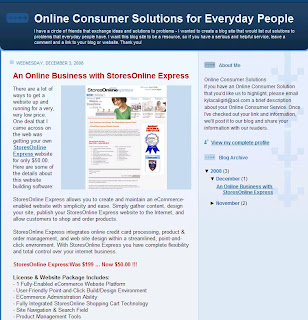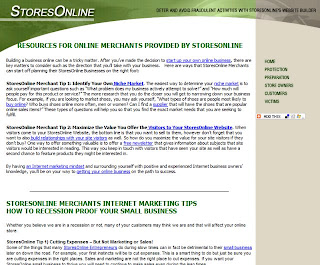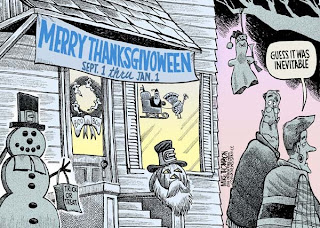
Many
StoresOnline business owners have a Pay-Per-Click (PPC) campaign running with
Google Adwords,
Yahoo Search Marketing, or
MSN adCenter, just to name a few. There are important factors that a
StoresOnline Merchant needs to consider when managing their PPC efforts. This is an excellent article about identifying the "
7 Fatal Flaws in Your Paid Search Campaign" by
Alex Yoder with
WebTrends:
"If you're spending money on SEM, it's highly likely that you're wasting some of your budget. Learn how to cut the fat.
Paid search advertising accounts for
more than 45 percent of the global online ad spend and, according to a recent forecast by
JP Morgan, search engine marketing will reach nearly
$30 billion this year.
More than half of that will come from large advertisers, who spend upwards of $50,000 per month, managing tens of thousands of keywords in their search portfolios (at
WebTrends, many of our clients are running campaigns using more than 1 million unique keyword combinations).
However, there is strong evidence that these heavily invested advertisers waste as much as 31 percent of their paid search dollars on sub-optimized search marketing campaigns.
WebTrends estimates this waste will amount to $4.5 billion globally in 2008 and is due to an overreliance on bid management tools that are inherently inefficient because of the manual procedures they require.
The following are the seven deadly sins of search marketing, plus insight on how you can find redemption and achieve the most from your online advertising dollars.
1) Failing to establish campaign goalsA surprising number of marketers fail to set campaign goals or review prior performance. Just because you're spending on paid search and seeing conversion activity come through your website does not mean dollars are allocated in the most efficient and effective way.
The first step toward a successful paid search campaign is to establish a baseline and performance thresholds from past results data. Then you can safely set campaign goals (maximizing revenue, gross profit or return on advertising spend) and monitor your progress.
2) Not identifying all the different types of possible conversion activitiesActions users take on your site indicate their degree of interest. Besides monetary transactions, other valuable conversions can include mailing list or newsletter sign-ups, demo or whitepaper downloads, user account creations or samples ordered. Make a business decision about which types of non-monetary conversions are valuable to your business and assign them appropriate values in the context of your paid search campaign.
3) Not taking a "big picture" approach to paid search campaignsPaid search campaigns should be evaluated in conjunction with SEO, display, email and other online marketing channels. Use analytics data to help you understand conversions by various channels, and keep in mind users frequently visit your site through various channels and can even click on multiple PPC ads before a conversion occurs.
The conversion latency your products experience and the methods you use to attribute conversions to specific campaigns can have a big impact on how you gauge performance. Also, a portfolio-based approach to managing keywords and bids helps ensure you don't overlook conversion volume from keyword combinations that are lower performers at an individual level but help maximize total conversion volume.
4) Misunderstanding the value of branded termsBranded terms play an important role in paid search marketing campaigns, but are frequently misunderstood. The key is to understand branded terms' role in the conversion cycle, as well as your audience’s conversion cycle behavior. In addition, you need to understand the consequences of focusing on branded terms only. While the branded term may be the last keyword typed prior to conversion, it most likely did not create the initial brand or product/service awareness. Broad and general terms drive users to your site.
5) Failing to take advantage of multivariate testingTo remain competitive, search marketers must bid in the most efficient way possible and harvest the available, but untapped, volume. As search engines continue to add new and innovative segmentation and targeting options, marketers are faced with almost unlimited choices in the number and complexity of campaign variables for their paid search campaigns.
While marketers frequently test different keyword match types, many do not experiment with ad creative and landing page options. Even paid search campaigns that the marketer may consider to be finely tuned can benefit from additional expansion and testing. Small increases in conversion rates or small decreases in average cost-per-click can greatly benefit your overall campaign performance over time.
6) Taking it on all yourselfIt is the quintessential rock-and-the hard place scenario of search marketing: while targeting and testing options abound, time and resources are limited. Optimizing paid search requires humans to do most of the heavy lifting, from a/b testing, reporting consolidation and results analysis to the seemingly never-ending bid rules creation and adjustments.
Newer automated SEM optimization solutions can help achieve an optimal balance between what machines do best -- handling the constant cycle of analysis, testing and updates across an organization’s paid search portfolio -- and the insight and perspective into external industry events and business drivers that humans bring. In a single day, these solutions can assess the performance of more than a million unique keyword combinations and make tens of thousands of bid changes. Try having even a roomful of SEM specialists do that!
7) Leaving it all to others (either agencies or automated solutions)Just because an agency or automated system is handling your paid search bidding doesn't mean that your work is done. Nobody knows your business like you do. That's why it’s important to react to and plan around changes in the marketplace, whether it is new competitors entering your space or seasonal changes that impact your business. These insights are invaluable in determining whether campaign goals and performance levels are appropriate, as well as whether "specialized" promotional periods are called for to help your business take advantage of previously untapped volume.
Conclusion: The bar for search marketing is only going to get higher. Competition-driven keyword inflation will likely be affected by market forces, including the gargantuan share of searches
Google holds, and, lest we forget, the likely sponsored search deal between
Google and
Yahoo. To survive, today's search marketers must be smarter, faster and more efficient than their competitors."











